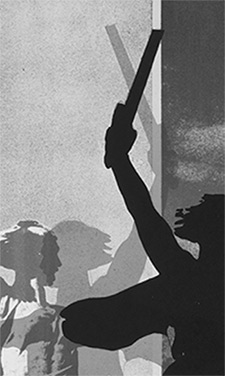Institute for Curatorial Practice Exhibition Opening

Presentations: 1 p.m., Liebling Center, Bill Brand Screening Room
Exhibitions: 2 – 3:30 p.m., Harold Johnson Library
Contact icp@hampshire.edu or see http://sites.hampshire.edu/curatorial-practice/
Students from across the country came to Hampshire this summer to study the history, theory, and practice of curation—applying new media and theories of experimental exhibition-making to the direct study of objects in the Mead Art Museum at Amherst College, Mount Holyoke College Art Museum, Smith College Museum of Art, and the University of Massachusetts at Amherst’s Museum of Contemporary Art. For their capstone projects they produced digital exhibitions for the web and the Projection Gallery at Hampshire College, based on the museums’ extensive collections and archives.
“Body [in/as] Landscape” applies the lenses of morphology and geomorphology to explore how landscapes and bodies interact with each other. In this context, the “body” primarily refers to the human body, but also bodies of water. “Landscape” refers to a natural or industrial scene that is mediated by the artist and viewer. “Body [in/as] Landscape” interrogates how our conception of the landscape changes when human forms or human activity intrude.
“Fields of Vision: Photography, (In)visibility, and the Constructed Landscape” combines the cultured construction of the landscape with the constructed perception of the photograph. The modalities of photography enable us to see the landscape in ways that we would not otherwise perceive. What the human eye may see as commonplace, banal, or unworthy of attention can suddenly appear as striking, surprising, or simply captivating when viewed through the photographer’s lens.
“Hidden Truths: Disrupting Utopia” asks us to reconsider the ways in which we distinguish between utopia and dystopia, and offers us alternative and unexpected methods for intervening in how we think about these spaces. Using juxtapositions of artworks and texts, the exhibition questions the distinctions that exist between utopic and dystopic spaces and has devised a new way of seeing images of ideal worlds.
Adjacent to the Hampshire College Art Gallery, the Projection Gallery (“Magic Board”) showcases film and video, photography, animation, graphics, light shows, digital exhibitions, and other hybrid forms.
The Institute for Curatorial Practice is supported by: the Samuel H. Kress Foundation, a Five College Mellon Foundation Digital Humanities Grant, the Hampshire College Summer Programs, the Harold Johnson Library, and the Office of the Dean of Faculty. The ICP is also supported by the generosity of the staff of Museums10: a collaborative that fosters lifelong learning through art, culture, science, and history through diverse exhibitions, collections, and programs. Its members are the Beneski Museum of Natural History, the Emily Dickinson Museum, the Eric Carle Museum of Picture Book Art, the Hampshire College Art Gallery, Historic Deerfield, the Mead Art Museum at Amherst College, the Mount Holyoke College Art Museum, the Smith College Museum of Art, the Yiddish Book Center, and the University Museum of Contemporary Art. Learn more at www.museums10.org.
